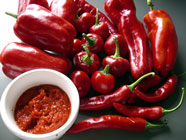I grow food organically and why not – it’s a no brainer isn’t it? Who wants to put chemicals on the food they are about to eat? I don’t, particularly when it’s not even necessary. Organic gardening just means working with nature, learning from the checks and balances that naturally occur, and fitting in with nature rather than working against it.
When you buy food in a supermarket with an organic label it usually means you pay a higher price but you still can’t be sure what you are getting. If you grow your own food it is quite simple and much more direct. Everything you put into the soil or onto the plant affects what you are about to eat. It just doesn’t make any sense to me to use toxic weed or bug killers, weeds are only plants that are in the wrong place and most bugs are actually helpful so if you slosh a load of chemicals about you will kill not only the weeds and pests but other plants and wildlife too not to mention trashing the soil and making your food taste awful.
I am not purist on the matter at all just pragmatic. It costs money to buy fertilisers, chemicals and bug controls and once you’ve had a whiff of some of the chemicals used no one in the right mind would want to put them on their food.
So the why is pretty simple. The how is where some people get hot under the collar, accusing those growing organically of not acting responsibly to keep pests and diseases at bay. Not so, good gardening is good gardening and chemicals are not the answer. Plants grow in a delicate balance and we should be careful not to disrupt it.
Gardening is really just interfering with how nature works and my aim is to interfere as little as possible. Just using a little common sense and a bit of plant know-how will make each little action go a long way.
simple things like
- timing tasks to work with the seasons and patterns through the year.
- looking after, improving and protecting the soil
- growing crops that naturally like the site and soil you have
- raising strong plants that will be capable of fending off disease and pest attack themselves
- keeping an eye on the weather and protecting crops before they get damaged
- timing crops to grow when pest on specific crops are less of a problem
- using natural or preventative plant medicines and feeds
- using one crop to help feed or shelter another
- using one crop to help deter pests from another
- not growing a crop in the open if it is threatened by too many pests you cannot stop
- rotating crops so that soil born diseases are not encouraged
- clearing any diseased crops immediately and burning
- keeping ground hoed and weed free
- washing propagation pots and trays between each batch

